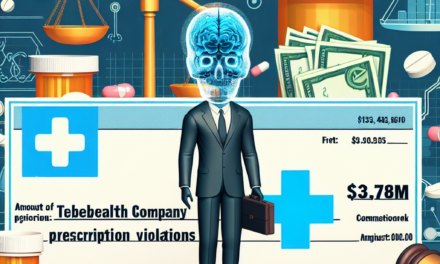AI Platforms in Healthcare: Tech Giants Unveil Responsible Rollout Plans

The integration of artificial intelligence (AI) into healthcare has been a transformative force, promising to revolutionize patient care, diagnostics, and operational efficiency. As tech giants like Google, Microsoft, and IBM unveil their AI platforms tailored for healthcare, the focus has shifted towards ensuring responsible and ethical deployment. This article delves into the strategies these companies are employing to roll out AI in healthcare responsibly, exploring the challenges, opportunities, and implications for the future.
1. The Rise of AI in Healthcare
AI’s potential in healthcare is vast, with applications ranging from predictive analytics to personalized medicine. The rise of AI in this sector is driven by the need to improve patient outcomes, reduce costs, and enhance the efficiency of healthcare delivery. As the industry grapples with an aging population and increasing demand for services, AI offers a promising solution.
AI technologies, such as machine learning and natural language processing, are being used to analyze vast amounts of data, identify patterns, and make predictions. This capability is particularly valuable in areas like diagnostics, where AI can assist in identifying diseases at an early stage, and in treatment planning, where it can help tailor interventions to individual patients.
However, the rise of AI in healthcare is not without challenges. Concerns about data privacy, algorithmic bias, and the potential for job displacement are significant. As such, tech giants are under pressure to ensure that their AI platforms are developed and deployed responsibly.
1.1 The Role of Big Data in AI Development
Big data is the backbone of AI in healthcare. The ability to collect, store, and analyze large datasets is crucial for training AI algorithms. Healthcare generates vast amounts of data, from electronic health records (EHRs) to medical imaging and genomic data. This data is invaluable for developing AI models that can improve patient care.
Tech giants are investing heavily in data infrastructure to support AI development. For example, Google’s DeepMind has partnered with several NHS hospitals in the UK to access patient data for research purposes. Similarly, IBM’s Watson Health has collaborated with healthcare providers to leverage big data for AI-driven insights.
- Data privacy and security are paramount concerns in AI development.
- Ensuring data quality and accuracy is essential for reliable AI models.
- Collaboration with healthcare providers is key to accessing valuable data.
1.2 AI’s Impact on Diagnostics and Treatment
AI is making significant strides in diagnostics and treatment. Machine learning algorithms can analyze medical images with high accuracy, assisting radiologists in detecting conditions like cancer and heart disease. AI is also being used to develop predictive models that can identify patients at risk of developing certain conditions, enabling early intervention.
In treatment, AI is helping to personalize medicine by analyzing patient data to identify the most effective therapies. This approach is particularly valuable in oncology, where AI can help match patients with clinical trials and tailor treatment plans based on genetic information.
- AI-driven diagnostics can reduce the burden on healthcare professionals.
- Personalized medicine improves patient outcomes and reduces costs.
- AI can enhance the accuracy and speed of medical decision-making.
1.3 Overcoming Challenges in AI Implementation
Despite its potential, implementing AI in healthcare is fraught with challenges. Data privacy and security are major concerns, as healthcare data is highly sensitive. Ensuring that AI algorithms are free from bias is also critical, as biased algorithms can lead to unequal treatment and exacerbate health disparities.
Tech giants are addressing these challenges by developing robust data governance frameworks and investing in bias detection and mitigation techniques. They are also working closely with regulators to ensure compliance with data protection laws and ethical standards.
- Data privacy and security are critical in healthcare AI.
- Bias detection and mitigation are essential for fair AI systems.
- Collaboration with regulators ensures compliance with ethical standards.
1.4 The Role of Collaboration in AI Development
Collaboration is key to the successful development and deployment of AI in healthcare. Tech giants are partnering with healthcare providers, academic institutions, and regulatory bodies to ensure that their AI platforms are effective and ethical.
These collaborations enable tech companies to access valuable data, gain insights into clinical workflows, and ensure that their AI solutions meet the needs of healthcare professionals and patients. They also facilitate knowledge sharing and innovation, driving the development of cutting-edge AI technologies.
- Partnerships with healthcare providers enable access to valuable data.
- Collaboration with academia fosters innovation and knowledge sharing.
- Engagement with regulators ensures compliance with ethical standards.
1.5 The Future of AI in Healthcare
The future of AI in healthcare is promising, with the potential to transform the industry and improve patient outcomes. As tech giants continue to invest in AI research and development, we can expect to see more advanced and sophisticated AI solutions in the coming years.
However, the responsible rollout of AI in healthcare will require ongoing collaboration, investment, and innovation. Tech companies must continue to prioritize data privacy, algorithmic fairness, and ethical considerations to ensure that AI benefits all patients and healthcare providers.
- AI has the potential to transform healthcare and improve patient outcomes.
- Ongoing collaboration and investment are essential for responsible AI deployment.
- Data privacy, fairness, and ethics must remain top priorities.
2. Tech Giants Leading the Charge
Several tech giants are at the forefront of AI development in healthcare, each bringing unique strengths and strategies to the table. Companies like Google, Microsoft, and IBM are leveraging their expertise in AI and data analytics to develop innovative solutions that address the challenges facing the healthcare industry.
These companies are not only investing in AI research and development but are also actively engaging with healthcare providers, regulators, and patients to ensure that their solutions are effective and ethical. By prioritizing responsible AI deployment, these tech giants are setting the standard for the industry.
2.1 Google’s DeepMind: Pioneering AI Research
Google’s DeepMind is a leader in AI research, with a strong focus on healthcare applications. The company has developed several AI models that have demonstrated impressive results in areas like medical imaging and predictive analytics.
DeepMind’s collaboration with the NHS in the UK has been particularly noteworthy. The partnership has enabled DeepMind to access valuable patient data, which has been used to develop AI models for early detection of conditions like acute kidney injury. These models have shown promise in improving patient outcomes and reducing healthcare costs.
- DeepMind’s AI models have demonstrated impressive results in medical imaging.
- The partnership with the NHS has enabled access to valuable patient data.
- AI models for early detection of conditions have shown promise in improving outcomes.
2.2 Microsoft’s Azure: Empowering Healthcare Providers
Microsoft’s Azure platform is empowering healthcare providers with AI-driven solutions that enhance patient care and operational efficiency. Azure’s AI capabilities are being used to develop predictive models, automate administrative tasks, and improve clinical decision-making.
Microsoft has also launched several initiatives to support healthcare providers in adopting AI technologies. The company offers training programs, resources, and support to help healthcare organizations integrate AI into their workflows. By prioritizing collaboration and education, Microsoft is helping to drive the responsible adoption of AI in healthcare.
- Azure’s AI capabilities enhance patient care and operational efficiency.
- Microsoft offers training and support to help healthcare providers adopt AI.
- Collaboration and education are key to responsible AI adoption.
2.3 IBM Watson Health: Revolutionizing Personalized Medicine
IBM Watson Health is revolutionizing personalized medicine with its AI-driven solutions. Watson’s AI capabilities are being used to analyze patient data, identify treatment options, and match patients with clinical trials. This approach is particularly valuable in oncology, where personalized treatment plans can significantly improve patient outcomes.
IBM is also focused on ensuring that its AI solutions are ethical and unbiased. The company has developed a robust framework for bias detection and mitigation, and is actively engaging with regulators to ensure compliance with data protection laws and ethical standards.
- Watson’s AI capabilities are revolutionizing personalized medicine.
- AI-driven solutions improve patient outcomes and reduce costs.
- IBM prioritizes ethical and unbiased AI solutions.
2.4 Amazon Web Services: Enhancing Healthcare Infrastructure
Amazon Web Services (AWS) is enhancing healthcare infrastructure with its cloud-based AI solutions. AWS offers a range of AI services that enable healthcare providers to store, analyze, and manage data more efficiently. These services are being used to develop predictive models, automate administrative tasks, and improve patient care.
AWS is also focused on ensuring data privacy and security. The company has implemented robust data protection measures and is actively engaging with regulators to ensure compliance with data protection laws. By prioritizing security and compliance, AWS is helping to drive the responsible adoption of AI in healthcare.
- AWS enhances healthcare infrastructure with cloud-based AI solutions.
- AI services enable efficient data management and improved patient care.
- Data privacy and security are top priorities for AWS.
2.5 Apple’s HealthKit: Empowering Patients
Apple’s HealthKit is empowering patients with AI-driven health monitoring and management tools. HealthKit enables users to track their health data, such as heart rate and activity levels, and share it with healthcare providers. This data can be used to develop personalized treatment plans and improve patient outcomes.
Apple is also focused on ensuring that its AI solutions are user-friendly and accessible. The company has developed a range of health apps and devices that are designed to be easy to use and integrate seamlessly into users’ daily lives. By prioritizing user experience, Apple is helping to drive the responsible adoption of AI in healthcare.
- HealthKit empowers patients with AI-driven health monitoring tools.
- Health data can be used to develop personalized treatment plans.
- User-friendly and accessible solutions drive responsible AI adoption.
3. Ethical Considerations in AI Deployment
The deployment of AI in healthcare raises several ethical considerations that must be addressed to ensure responsible and equitable use. As tech giants roll out their AI platforms, they must navigate complex ethical issues related to data privacy, algorithmic bias, and patient consent.
Addressing these ethical considerations is critical to building trust with patients, healthcare providers, and regulators. By prioritizing ethical AI deployment, tech companies can ensure that their solutions benefit all stakeholders and contribute to improved patient outcomes.
3.1 Data Privacy and Security
Data privacy and security are paramount concerns in the deployment of AI in healthcare. Healthcare data is highly sensitive, and any breach of privacy can have serious consequences for patients. Tech giants must implement robust data protection measures to ensure that patient data is secure and used responsibly.
Companies like Google, Microsoft, and IBM are investing heavily in data security infrastructure and protocols. They are also working closely with regulators to ensure compliance with data protection laws, such as the General Data Protection Regulation (GDPR) in Europe and the Health Insurance Portability and Accountability Act (HIPAA) in the United States.
- Data privacy and security are critical in healthcare AI deployment.
- Robust data protection measures are essential to protect patient data.
- Compliance with data protection laws is a top priority for tech giants.
3.2 Algorithmic Bias and Fairness
Algorithmic bias is a significant ethical concern in AI deployment. Biased algorithms can lead to unequal treatment and exacerbate health disparities. Tech giants must ensure that their AI models are free from bias and provide fair and equitable treatment for all patients.
Companies like IBM and Microsoft are investing in bias detection and mitigation techniques to address this issue. They are also engaging with diverse stakeholders, including patients, healthcare providers, and advocacy groups, to ensure that their AI solutions are inclusive and equitable.
- Algorithmic bias can lead to unequal treatment and health disparities.
- Bias detection and mitigation are essential for fair AI systems.
- Engagement with diverse stakeholders ensures inclusive AI solutions.
3.3 Informed Consent and Patient Autonomy
Informed consent is a fundamental ethical principle in healthcare. Patients must be fully informed about how their data will be used and have the autonomy to make decisions about their care. Tech giants must ensure that their AI solutions respect patient autonomy and provide clear and transparent information about data use.
Companies like Apple and Amazon are prioritizing user-friendly interfaces and clear communication to ensure that patients understand how their data is being used. They are also working closely with healthcare providers to ensure that patients have the information they need to make informed decisions about their care.
- Informed consent is a fundamental ethical principle in healthcare.
- Patients must be fully informed about how their data will be used.
- User-friendly interfaces and clear communication are essential.
3.4 Transparency and Accountability
Transparency and accountability are critical to building trust in AI solutions. Tech giants must be transparent about how their AI models work and be accountable for their outcomes. This includes providing clear explanations of AI decision-making processes and being open about any limitations or potential biases in their models.
Companies like Google and IBM are prioritizing transparency by providing detailed documentation and explanations of their AI models. They are also engaging with regulators and stakeholders to ensure that their solutions are accountable and meet ethical standards.
- Transparency and accountability are critical to building trust in AI.
- Clear explanations of AI decision-making processes are essential.
- Engagement with regulators ensures accountability and ethical standards.
3.5 The Role of Ethics Committees and Advisory Boards
Ethics committees and advisory boards play a crucial role in ensuring responsible AI deployment. These bodies provide oversight and guidance on ethical issues related to AI in healthcare. Tech giants are increasingly establishing ethics committees and advisory boards to ensure that their AI solutions meet ethical standards.
These committees and boards are composed of diverse stakeholders, including ethicists, healthcare providers, patients, and advocacy groups. They provide valuable insights and recommendations on ethical issues, helping tech companies navigate complex ethical challenges and ensure responsible AI deployment.
- Ethics committees and advisory boards provide oversight and guidance.
- Diverse stakeholders offer valuable insights on ethical issues.
- Committees and boards help ensure responsible AI deployment.
4. Regulatory Frameworks and Compliance
The deployment of AI in healthcare is subject to a complex web of regulatory frameworks that govern data protection, patient safety, and ethical standards. Tech giants must navigate these regulations to ensure that their AI solutions are compliant and meet the highest standards of safety and ethics.
Regulatory compliance is critical to building trust with patients, healthcare providers, and regulators. By prioritizing compliance, tech companies can ensure that their AI solutions are safe, effective, and ethical.
4.1 Data Protection Regulations
Data protection regulations, such as the GDPR in Europe and HIPAA in the United States, govern the collection, storage, and use of healthcare data. These regulations are designed to protect patient privacy and ensure that data is used responsibly.
Tech giants must ensure that their AI solutions comply with these regulations. This includes implementing robust data protection measures, obtaining informed consent from patients, and ensuring that data is used for legitimate purposes.
- Data protection regulations govern the use of healthcare data.
- Compliance with regulations is essential to protect patient privacy.
- Robust data protection measures are critical for compliance.
4.2 Patient Safety and Quality Standards
Patient safety and quality standards are critical in healthcare. AI solutions must meet these standards to ensure that they are safe and effective. Tech giants must work closely with regulators to ensure that their AI solutions meet the highest standards of patient safety and quality.
This includes conducting rigorous testing and validation of AI models, obtaining regulatory approvals, and continuously monitoring the performance of AI solutions to ensure that they remain safe and effective.
- Patient safety and quality standards are critical in healthcare.
- AI solutions must meet these standards to ensure safety and effectiveness.
- Rigorous testing and validation are essential for compliance.
4.3 Ethical Standards and Guidelines
Ethical standards and guidelines govern the responsible use of AI in healthcare. These standards are designed to ensure that AI solutions are fair, transparent, and accountable. Tech giants must ensure that their AI solutions meet these ethical standards.
This includes addressing issues related to algorithmic bias, informed consent, and transparency. Companies like IBM and Microsoft are actively engaging with regulators and stakeholders to ensure that their AI solutions meet ethical standards and contribute to improved patient outcomes.
- Ethical standards govern the responsible use of AI in healthcare.
- AI solutions must be fair, transparent, and accountable.
- Engagement with regulators ensures compliance with ethical standards.
4.4 The Role of Regulatory Bodies
Regulatory bodies play a crucial role in overseeing the deployment of AI in healthcare. These bodies provide guidance and oversight on regulatory compliance, patient safety, and ethical standards. Tech giants must work closely with regulatory bodies to ensure that their AI solutions meet regulatory requirements.
Regulatory bodies, such as the FDA in the United States and the EMA in Europe, provide valuable guidance on the development and deployment of AI solutions. By engaging with these bodies, tech companies can ensure that their AI solutions are safe, effective, and compliant with regulatory standards.
- Regulatory bodies provide guidance and oversight on AI deployment.
- Engagement with regulatory bodies ensures compliance with standards.
- Regulatory guidance is critical for safe and effective AI solutions.
4.5 The Future of Regulatory Compliance
The future of regulatory compliance in AI healthcare is evolving rapidly. As AI technologies continue to advance, regulatory frameworks must adapt to address new challenges and opportunities. Tech giants must stay ahead of regulatory developments to ensure that their AI solutions remain compliant and meet the highest standards of safety and ethics.
This includes staying informed about regulatory changes, engaging with regulators and stakeholders, and continuously improving AI solutions to meet evolving standards. By prioritizing regulatory compliance, tech companies can ensure that their AI solutions are safe, effective, and ethical.
- The future of regulatory compliance in AI healthcare is evolving rapidly.
- Regulatory frameworks must adapt to address new challenges and opportunities.
- Staying informed about regulatory changes is critical for compliance.
5. The Path Forward: Responsible AI Deployment
The responsible deployment of AI in healthcare is a complex and multifaceted challenge that requires collaboration, innovation, and commitment from all stakeholders. Tech giants, healthcare providers, regulators, and patients must work together to ensure that AI solutions are safe, effective, and ethical.
By prioritizing responsible AI deployment, tech companies can ensure that their solutions benefit all stakeholders and contribute to improved patient outcomes. This includes addressing ethical considerations, ensuring regulatory compliance, and fostering collaboration and innovation.
5.1 Collaboration and Partnership
Collaboration and partnership are key to the responsible deployment of AI in healthcare. Tech giants must work closely with healthcare providers, regulators, and patients to ensure that their AI solutions meet the needs of all stakeholders.
This includes engaging with diverse stakeholders to gain insights into clinical workflows, patient needs, and regulatory requirements. By fostering collaboration and partnership, tech companies can ensure that their AI solutions are effective, ethical, and aligned with the needs of the healthcare industry.
- Collaboration and partnership are key to responsible AI deployment.
- Engagement with diverse stakeholders ensures effective AI solutions.
- Partnerships align AI solutions with the needs of the healthcare industry.
5.2 Innovation and Research
Innovation and research are critical to the development of cutting-edge AI solutions in healthcare. Tech giants must continue to invest in AI research and development to drive innovation and improve patient outcomes.
This includes exploring new AI technologies, developing advanced algorithms, and conducting rigorous testing and validation of AI models. By prioritizing innovation and research, tech companies can ensure that their AI solutions remain at the forefront of the industry and contribute to improved patient care.
- Innovation and research drive the development of cutting-edge AI solutions.
- Investment in AI research is critical for improved patient outcomes.
- Advanced algorithms and rigorous testing ensure effective AI solutions.
5.3 Education and Training
Education and training are essential to the responsible adoption of AI in healthcare. Tech giants must provide healthcare providers with the resources and support they need to integrate AI into their workflows effectively.
This includes offering training programs, educational resources, and support services to help healthcare providers understand and use AI technologies. By prioritizing education and training, tech companies can ensure that healthcare providers are equipped to leverage AI solutions effectively and ethically.
- Education and training are essential for responsible AI adoption.
- Training programs and resources support effective AI integration.
- Healthcare providers must be equipped to leverage AI solutions ethically.
5.4 Continuous Improvement and Monitoring
Continuous improvement and monitoring are critical to ensuring that AI solutions remain safe, effective, and ethical. Tech giants must continuously monitor the performance of their AI solutions and make improvements as needed.
This includes conducting regular audits, gathering feedback from stakeholders, and making updates to AI models to address any issues or limitations. By prioritizing continuous improvement and monitoring, tech companies can ensure that their AI solutions remain at the forefront of the industry and contribute to improved patient outcomes.
- Continuous improvement and monitoring ensure safe and effective AI solutions.
- Regular audits and





